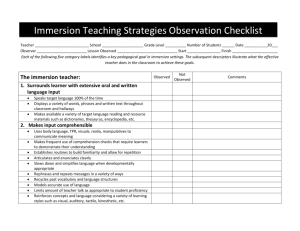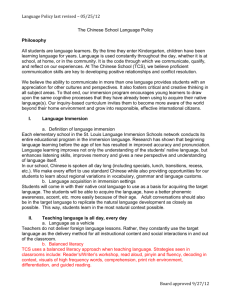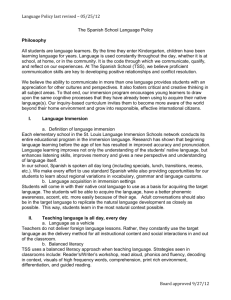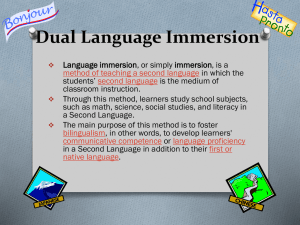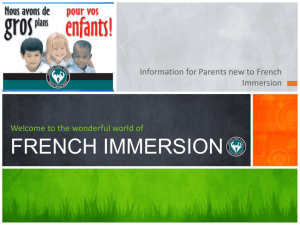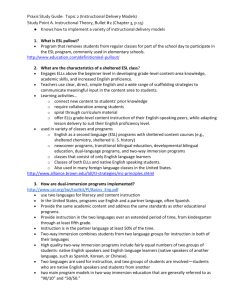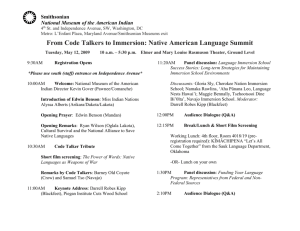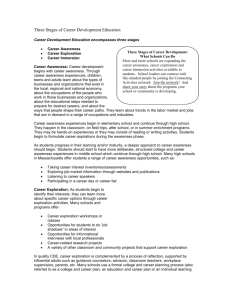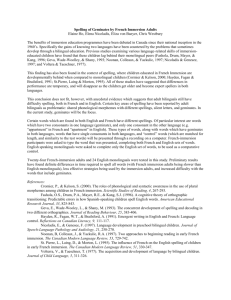Language Policy last revised – 05/25/12 The French School
advertisement
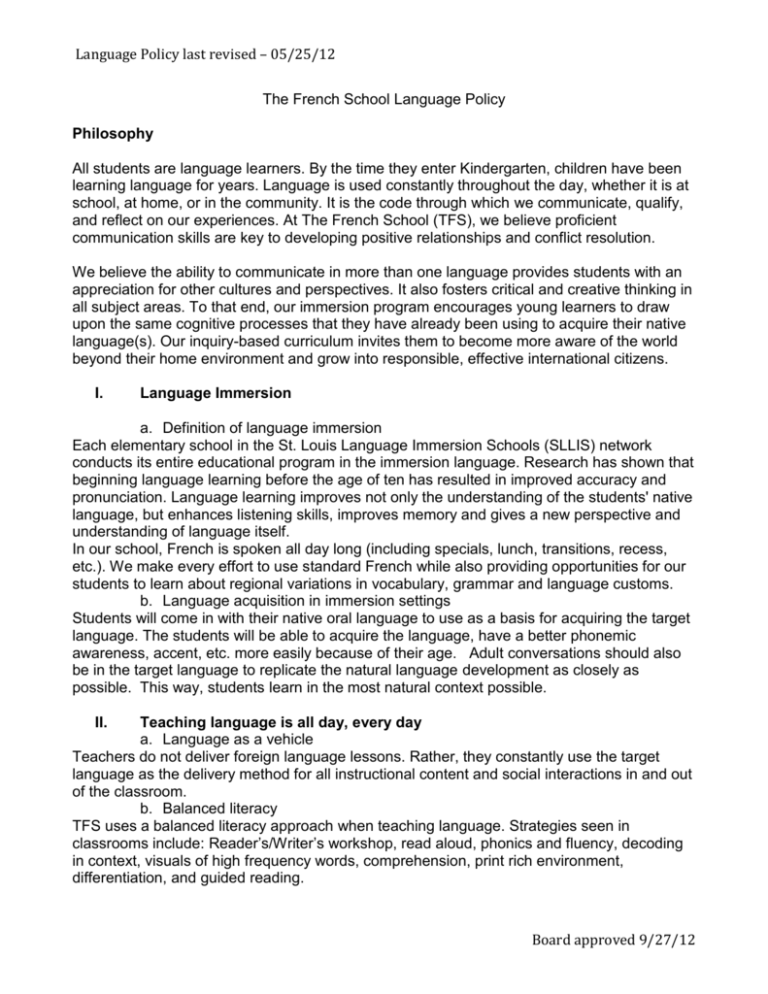
Language Policy last revised – 05/25/12 The French School Language Policy Philosophy All students are language learners. By the time they enter Kindergarten, children have been learning language for years. Language is used constantly throughout the day, whether it is at school, at home, or in the community. It is the code through which we communicate, qualify, and reflect on our experiences. At The French School (TFS), we believe proficient communication skills are key to developing positive relationships and conflict resolution. We believe the ability to communicate in more than one language provides students with an appreciation for other cultures and perspectives. It also fosters critical and creative thinking in all subject areas. To that end, our immersion program encourages young learners to draw upon the same cognitive processes that they have already been using to acquire their native language(s). Our inquiry-based curriculum invites them to become more aware of the world beyond their home environment and grow into responsible, effective international citizens. I. Language Immersion a. Definition of language immersion Each elementary school in the St. Louis Language Immersion Schools (SLLIS) network conducts its entire educational program in the immersion language. Research has shown that beginning language learning before the age of ten has resulted in improved accuracy and pronunciation. Language learning improves not only the understanding of the students' native language, but enhances listening skills, improves memory and gives a new perspective and understanding of language itself. In our school, French is spoken all day long (including specials, lunch, transitions, recess, etc.). We make every effort to use standard French while also providing opportunities for our students to learn about regional variations in vocabulary, grammar and language customs. b. Language acquisition in immersion settings Students will come in with their native oral language to use as a basis for acquiring the target language. The students will be able to acquire the language, have a better phonemic awareness, accent, etc. more easily because of their age. Adult conversations should also be in the target language to replicate the natural language development as closely as possible. This way, students learn in the most natural context possible. II. Teaching language is all day, every day a. Language as a vehicle Teachers do not deliver foreign language lessons. Rather, they constantly use the target language as the delivery method for all instructional content and social interactions in and out of the classroom. b. Balanced literacy TFS uses a balanced literacy approach when teaching language. Strategies seen in classrooms include: Reader’s/Writer’s workshop, read aloud, phonics and fluency, decoding in context, visuals of high frequency words, comprehension, print rich environment, differentiation, and guided reading. Board approved 9/27/12 Language Policy last revised – 05/25/12 c. School-wide Expectations As a total immersion school, we have the expectation that all students and staff will use the target language throughout the school day and at all school-wide events. Each grade level often chooses to include this expectation in their classroom or grade-level essential agreements. d. Communication Arts standards in the Program of Inquiry Most, if not all, of Missouri Communication Arts standards are included in the units of inquiry. If there is a standard that is not addressed within a unit for some reason, it will be taught as part of a stand-alone lesson. e. Lunch Bunch Students eat their meals in a group of their peers and one adult (10:1). This provides a relaxed atmosphere to learn about nutrition choices, table etiquette and each other. Teachers reinforce polite vocabulary and provide additional opportunities for vocabulary input and extended discourse. In upper elementary grades students learn how to facilitate their own lunch conversations in the immersion language. f. Family involvement TFS offers parent classes in the target language open to all families of any level of proficiency. There are opportunities for families throughout the year to attend performances and cultural events in the target language. III. English language support a. ELL We are committed to providing the opportunity for all of our students to be completely bilingual and bi-literate. Our English Language Learner classes support these students in their English language acquisition. In accordance with federal and state mandates, TFS assesses and provides English language instructional services for students identified as English Language Learners. Within the first 30 days of attending school with us, a student who has a home language influence other than, or in addition to English, is screened for English language proficiency. Students who meet the federal guidelines for English Language Learners are assigned to small group English instruction during the school day. Each school year students who are receiving services have two additional testing periods using the WIDA assessment to measure their growth in English language acquisition. As a student’s English language acquisition progresses, they gradually end ELL services. b. Book & Math club, MAP (Missouri Assessment Program) preparation (beginning in 3rd grade) We will provide after school opportunities to speak, listen, read and write in English in the context of literature and math studies. This will give students support and enrichment in English. c. English Language Arts Specialist Daily formal instruction in English reading and writing begins in the second semester of 2nd grade. English language instruction supports the PYP units of inquiry. Board approved 9/27/12 Language Policy last revised – 05/25/12 Every student in our school learns to communicate and work in both English and the French. Over the course of the K-12 continuum, students receive equal amounts of instruction and develop grade-level fluency in both languages. d. The library includes a variety of both fiction and non-fiction books in both French and English. IV. Assessment of Language Language is assessed both formally and informally. Teachers assess in a variety of ways. More information about assessment of language can be found in the TFS Assessment Policy. Progress in the target language is communicated with parents at quarterly parent teacher conferences and in report cards. All standardized and language assessment results are also communicated at these times. V. Review This policy will be reviewed annually by language policy committee and the PYP coordinator. Board approved 9/27/12
